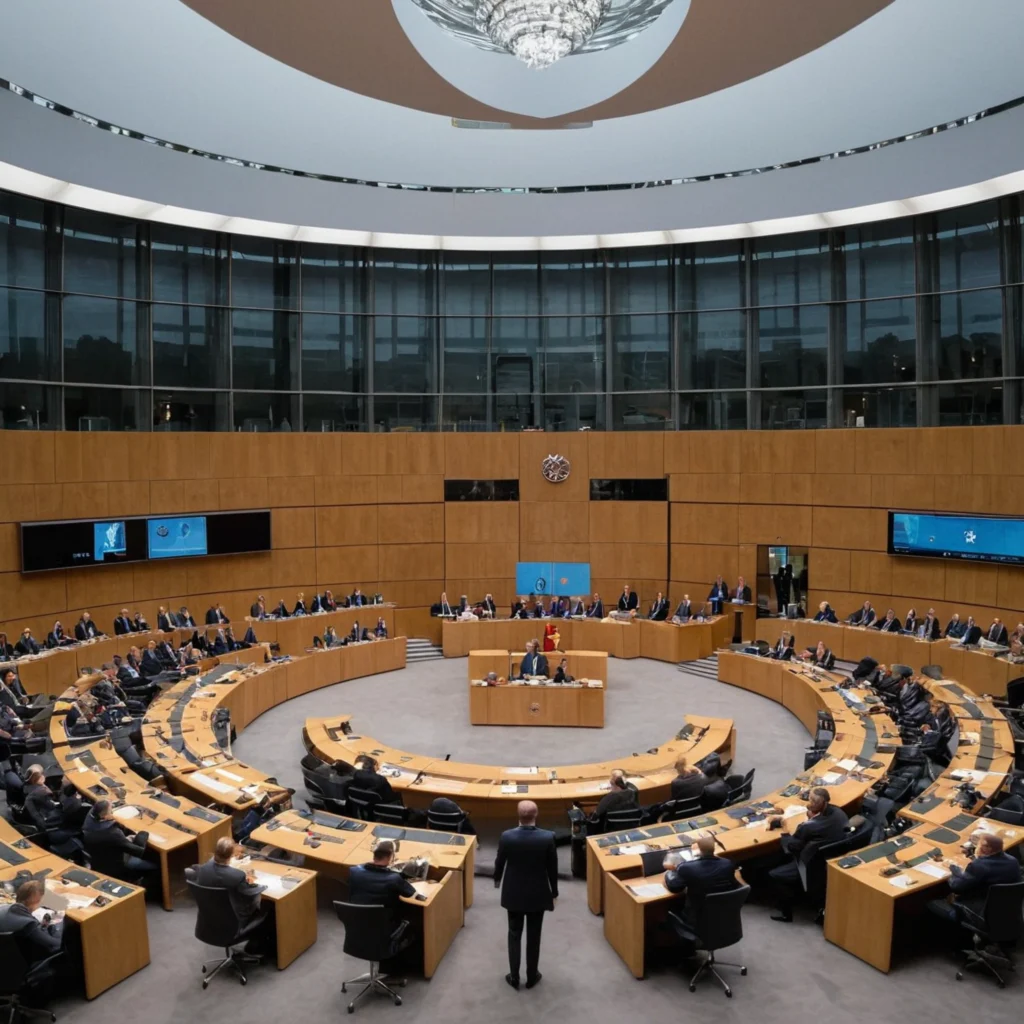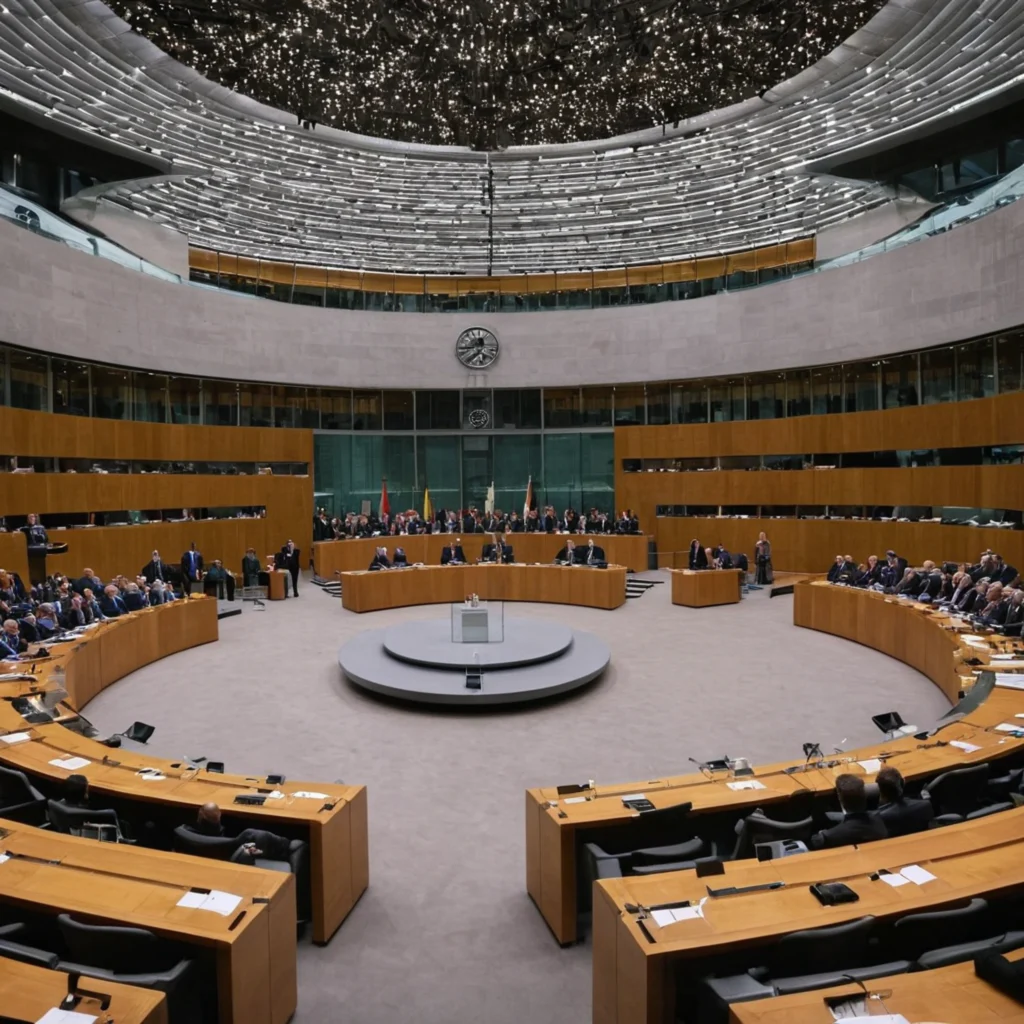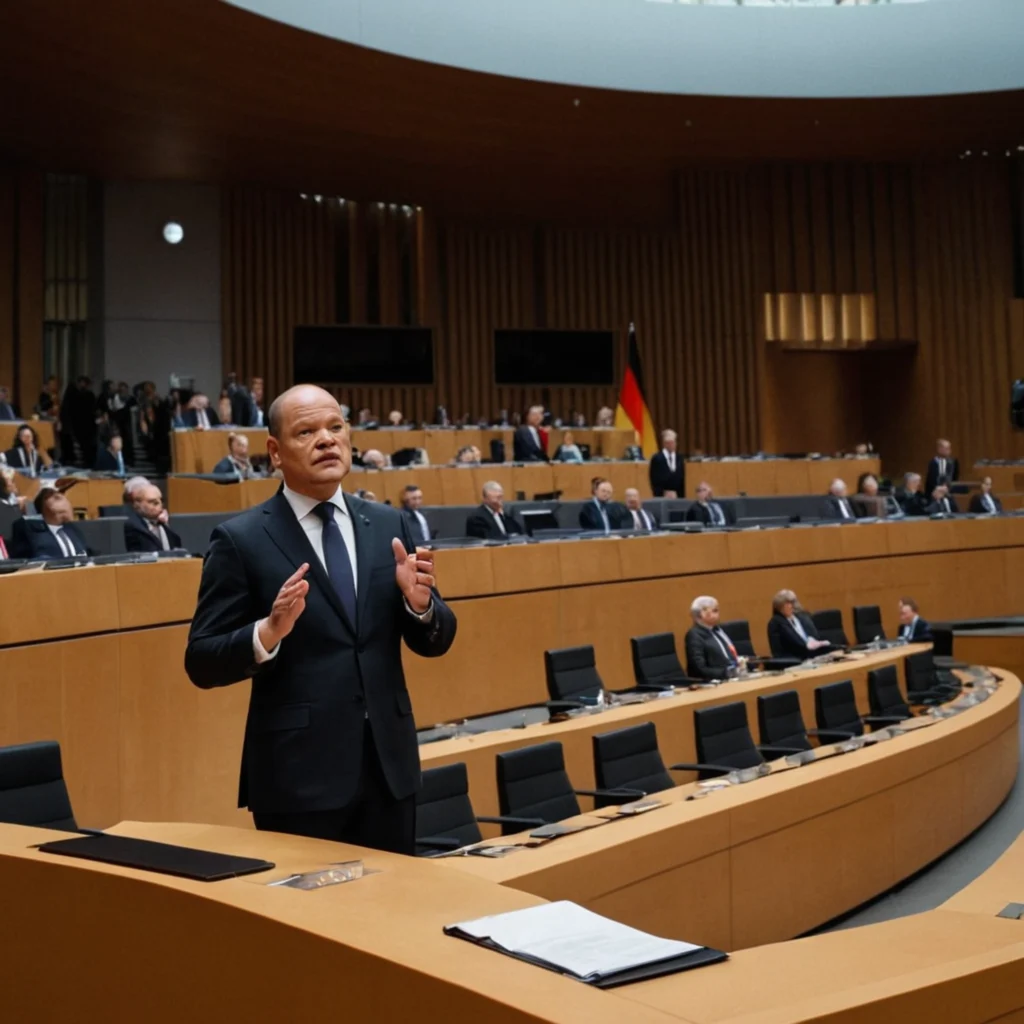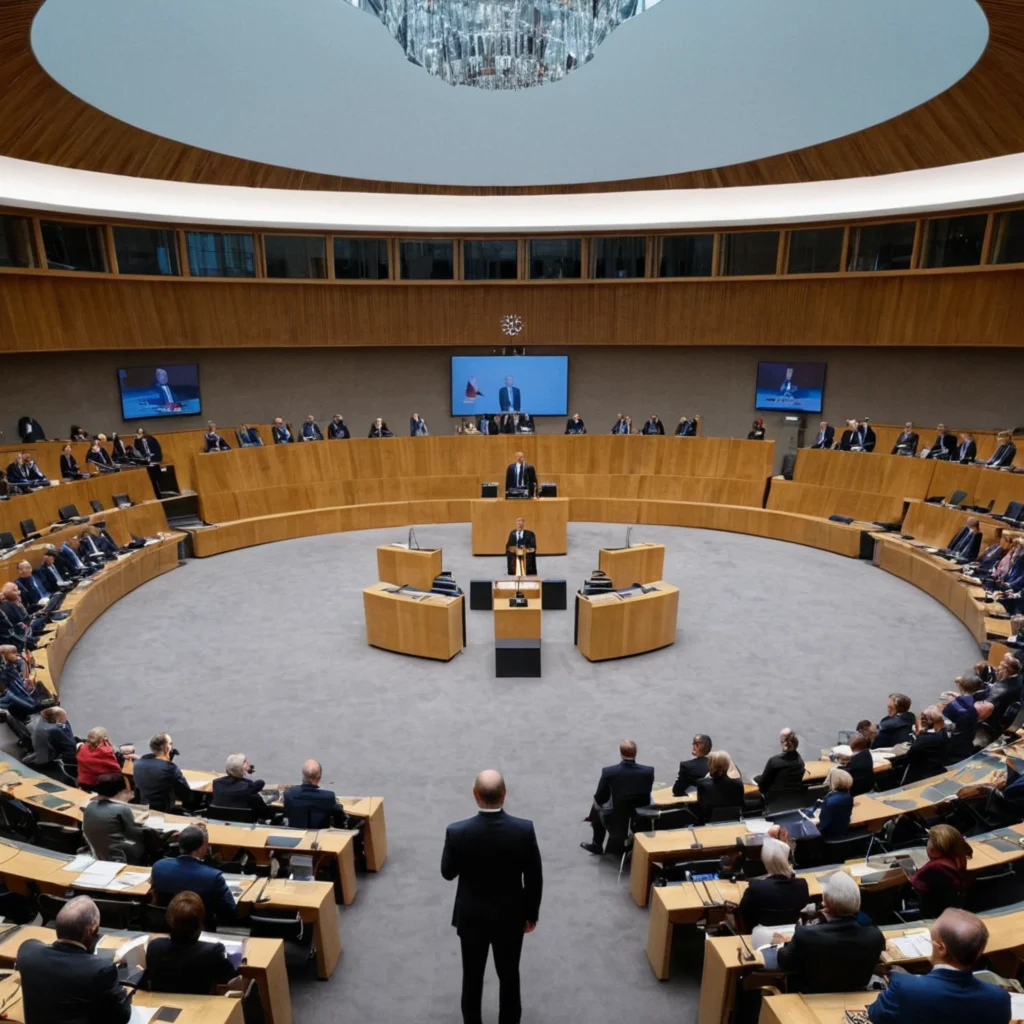Olaf Scholz’s 2024 Government Statement: Germany’s political landscape in 2024 has taken a dramatic turn. Following the collapse of the “Ampel” coalition, which comprised the Social Democratic Party (SPD), the Greens, and the Free Democratic Party (FDP), Chancellor Olaf Scholz delivered a significant government statement (Regierungserklärung) on November 13, 2024. This speech comes at a time when the nation is facing a political crisis, with upcoming elections scheduled for February 23, 2025, and Scholz set to face a vote of confidence in the Bundestag on December 16, 2024.
Olaf Scholz’s 2024 Government Statement: Addressing the Political Crisis in Germany

Scholz’s speech was a crucial moment in setting the stage for his party’s campaign, while also addressing the uncertainties that have surfaced due to the coalition’s failure. The collapse of the coalition has intensified political competition, and Germany’s future now hinges on both the election and the outcomes of the vote of confidence. In this blog, we’ll delve into the key aspects of Scholz’s government statement, the broader political context, and what the future might hold for Germany.
Olaf Scholz’s 2024 Government Statement: A Turning Point for Germany

Olaf Scholz’s 2024 government statement reflects on the political turmoil Germany is currently facing. The speech touches on the collapse of the Ampel coalition and sets the tone for the upcoming elections. With Germany at a political crossroads, the 2024 government statement serves as an important milestone for Chancellor Scholz as he seeks to regain public trust and guide the country through a series of pivotal challenges.
1. The Collapse of the Ampel Coalition
The Ampel coalition—formed by the SPD, Greens, and FDP—was an ambitious and progressive government that sought to drive reforms on various fronts, from climate change to economic recovery. However, deep-seated disagreements between the coalition partners led to its collapse. While the SPD, under Scholz’s leadership, aimed for moderate reforms and a balanced approach to governance, the Greens pushed for more aggressive climate policies, and the FDP advocated for fiscal conservatism. The growing friction between these priorities proved unsustainable.
Key points of contention included:
- Climate policy: The Greens wanted stricter climate laws, while the FDP opposed measures that could hinder economic growth.
- Economic strategies: Disagreements on managing inflation, the energy crisis, and post-pandemic recovery weakened the coalition’s unity.
- Social reforms: Varying perspectives on issues like housing policy and taxation created further rifts.
The collapse of the coalition came as a shock, triggering uncertainty and leaving Scholz with the challenge of steering Germany through a precarious transition period.
2. Scholz’s Key Messages in His Government Statement
Olaf Scholz’s government statement served multiple purposes. It was not only a reflection on his government’s achievements but also an opportunity to frame the upcoming election in February 2025. His speech focused on themes of stability, continuity, and the importance of pragmatic leadership in turbulent times.
Key themes from Scholz’s address included:
- Economic resilience: Scholz emphasized his government’s efforts to stabilize the German economy despite global economic downturns, the energy crisis, and inflation. He pointed to Germany’s resilience in overcoming these challenges.
- Social justice: Scholz reiterated his commitment to creating a fairer society, highlighting measures like minimum wage increases, pension reforms, and affordable housing initiatives as part of his legacy.
- Climate policy: While acknowledging the need for climate action, Scholz emphasized a balanced approach that considers both environmental and economic sustainability, aiming to unite Germany’s green ambitions with its industrial base.
Throughout his speech, Scholz positioned himself as a steady hand, contrasting his leadership style with the uncertainty surrounding the opposition.

3. The Road to the February 2025 Election
The upcoming election, scheduled for February 23, 2025, will be a crucial moment for Germany’s political future. With the Ampel coalition’s collapse, the race for the Chancellorship is wide open. Scholz’s government statement was, in many ways, a soft launch of his re-election campaign, as he set out to highlight his administration’s accomplishments and outline his vision for the future.
Facing a vote of confidence in December, Scholz will need to secure enough support to remain in power until the election. Even if he survives the confidence vote, his party will have to contend with growing competition from a range of political opponents.
Major contenders in the election include:
- Friedrich Merz (CDU): The leader of the Christian Democratic Union (CDU), Merz has been positioning himself as a conservative alternative to Scholz, advocating for a return to fiscal discipline and traditional values.
- Robert Habeck (Greens): As a key figure within the Green Party, Habeck is expected to push hard on climate policies, hoping to capitalize on the collapse of the coalition.
- Alice Weidel (AfD): The far-right Alternative for Germany (AfD) is likely to gain more ground, focusing on immigration, nationalism, and economic populism.
The outcome of the election could reshape Germany’s policy trajectory, both domestically and on the international stage, as the country continues to play a leading role in the European Union.
4. Scholz’s Vote of Confidence

Before the election, Olaf Scholz faces an immediate hurdle—the vote of confidence scheduled for December 16, 2024. The vote is a critical moment for Scholz, as it will determine whether he has the support to remain Chancellor until the elections. If he loses the vote, his government could be dissolved, potentially leading to earlier elections or an interim leadership arrangement.
While Scholz’s Social Democratic Party (SPD) is largely expected to back him, there are tensions within the party. Some members have questioned Scholz’s handling of the coalition collapse, and there are whispers of internal leadership challenges. However, with the stakes so high, most of the SPD is likely to unite behind Scholz, at least for the time being.
The vote of confidence is a key moment not only for Scholz but also for the broader German political landscape. It could either solidify Scholz’s position as a candidate for continuity or open the door for alternative leadership in the lead-up to the election.
5. Germany’s Challenges in 2024
As Scholz navigates this political crisis, Germany faces a range of pressing challenges. Economic pressures, including inflation, rising energy costs, and a slow recovery from the COVID-19 pandemic, continue to affect everyday Germans. Additionally, the war in Ukraine and its implications for Europe’s energy supply have exacerbated concerns about energy security.
Scholz’s government has worked to mitigate these challenges, but the fractured political climate has made it difficult to pass comprehensive reforms. Key issues that will likely dominate the election campaign include:
- Energy policy: With Germany heavily reliant on Russian gas, the energy crisis is a central concern. Scholz will need to defend his government’s handling of energy security and renewable energy transitions.
- Economic recovery: Inflation and economic slowdown remain top concerns for voters. Scholz’s ability to maintain economic stability will be a key point of debate.
- Climate change: Germany’s ambitious climate goals have been a point of contention. Scholz will need to balance the country’s industrial needs with the push for greener policies.
6. Opposition Reaction and Political Rivals
The opposition parties have seized the opportunity to challenge Scholz’s leadership in the wake of the coalition’s collapse. Friedrich Merz, the leader of the CDU, has been particularly vocal in criticizing Scholz’s handling of the crisis. Merz has framed the collapse as a failure of Scholz’s leadership and has called for a return to conservative policies, including stricter fiscal controls and a more restrained approach to climate change.
Similarly, the Green Party, led by Robert Habeck, has used the collapse to push for more aggressive climate reforms, arguing that Scholz’s moderate approach has hindered progress. The far-right AfD, under Alice Weidel, has focused on the discontent surrounding immigration and economic hardship, seeking to capitalize on voter dissatisfaction.
Conclusion
Olaf Scholz’s 2024 government statement marks a critical moment in Germany’s political journey. The collapse of the Ampel coalition has reshaped the political landscape, and the upcoming election in February 2025, along with the December vote of confidence, will determine Scholz’s fate. With Germany facing a host of challenges—ranging from economic pressures to energy crises—Scholz’s leadership and the country’s next steps will have significant implications for both its domestic policy and its role in the European Union.
For more detailed insights into Olaf Scholz’s 2024 government statement and its implications on German politics, check out this analysis from Politico.

